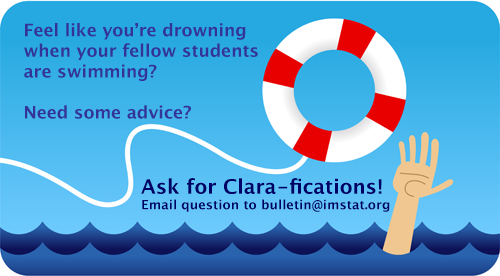Clara Grazian, Senior Lecturer in Statistics in the School of Mathematics and Statistics at the University of Sydney, continues our advice column for (anonymous) early-career researchers.
Question: I am close to finishing my PhD in Statistics in a country that is part of Europe, although I don’t have a traditional background as I am a first generation immigrant and I am in my mid-30s. I enjoy research quite a lot and I have had the amazing opportunity to attend several events, and even present at some. However, I have the constant feeling that there is no future in academia for me. This is hard to grasp at times. Perhaps I’m wrong. Do you have any advice ?
Clara responds: I’m really sorry to hear that you feel there’s no future for you in academia. However, I can assure you that this is a common feeling among PhD students (and postdocs, and even faculty members). Part of the problem is the uncertainty of the job, particularly in the early years of a career.
The impression I get from your question is: “Is it too late for me to have an academic job? Is it okay to look for a job in your 30s?” In my experience, academia is a welcoming environment, and universities have many inclusivity rules that people generally respect and share. This means that, when applying for an academic position, the hiring process should not discriminate against candidates for any reason, including age.
In some systems (for example, the Italian one), there may be limitations in terms of years of contracts (e.g., as postdocs) when applying for a faculty position, or years from the completion of a PhD. This can vary from country to country. However, I have never seen a limitation based on age—though this doesn’t mean it doesn’t exist in some parts of the world!
There could be countries where a range of previous experiences is valued more highly than in others. My general feeling is that some countries (such as the UK, US, and Australia) tend to be more open to varied previous experiences than some continental European countries. However, I’ve met academics in many countries, including France and Italy, who obtained a Faculty position in their 30s or even in their 40s, after a range of experiences.
Overall, I think academia is more flexible than it might seem. Many students believe there’s A Perfect Path from university to lectureship/assistant professorship, but that’s not true at all. Some decisions may slow down a career a bit, but usually, you can change paths quite easily. For example, I did a postdoc in a field quite unrelated to my PhD and subsequent research as a Lecturer. I thought it would negatively impact my career, but in the end, it became a source of experience and helped me gain a broader perspective. Similarly, I know people who spent several years in industry before getting an academic job. Those years were not “useless” but contributed to their overall vision and research.
If you’re worried about your background, please don’t be. It’s sad to think that our PhD students are concerned about their backgrounds. It’s true that some academics come from families of academics, but many are the first in their families to earn a degree (like me!), and many come from immigrant families. What you’ve achieved should be a source of pride, not worry. Can I assure you that you’ll always find environments where this isn’t an issue? No, I can’t. Unfortunately, not every environment is inclusive— but this is true for academia and industry. But honestly, you wouldn’t want to work in those environments anyway. There are better workplaces, and academia usually has very diverse staff members—it’s one of its strengths.
What I believe is this: if you have passion and love for this profession, there can be a place for you in academia. It may not be easy, but it’s not easy for anyone, even those on a more “direct” path—university, PhD, Postdoc, Faculty position. The central question should be: What do you want? And, are you happy in the job you’re doing? I cannot tell you that there will be a place for you in academia, but do not avoid trying if this is what you want. There are many amazing and bright researchers who, for the most varied reasons, decide to leave academia. But if it is what you want right now, then try!

Do you need some friendly advice? Are you unsure how to do something? Does everyone around you look like they know exactly what they’re doing? (They really don’t!). Send your question about the life of a researcher or ask for career advice, and Clara-fications columnist Clara Grazian will respond in the next available issue.
Don’t worry, we won’t publish your name!
Your question might even be what someone else has been secretly wondering, but was too afraid to ask…
Send your questions for Clara to bulletin@imstat.org.